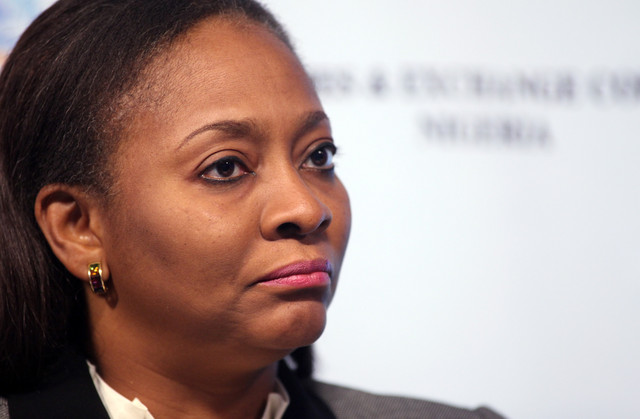
States clamoring to sell bonds before next year’s election are seeing their plans threatened as the Securities and exchange Commission tighten the requirements for issuing debt
Federal officials will prove less willing to approve sales as the February 2015 vote approaches, Arunma Oteh, director general of the Nigerian Securities and Exchange Commission, said in an interview this month. They may take a more skeptical look at each state’s debt levels and allocations from the federal government, said Samir Gadio, a London-based emerging-markets strategist atStandard Bank Group Ltd.
“As you come close to an election we become tougher on the requirements for states to come to market,” Oteh said in a Jan. 15 interview in the capital, Abuja. “I don’t know how many of them will cross the hurdle this year.”
Most of the 36 states in Nigeria, the continent’s biggest oil producer, are targeting debt sales this year, Abraham Nwankwo, director general of the Debt Management Office, which manages the country’s bond issuance, said in a Jan. 15 interview in Abuja. Six states, including Lagos and Osun, sold 126 billion naira ($773 million) in bonds or Shariah-compliant debt last year, and 16 have outstanding bonds, according to Lagos-based ratings company Agusto & Co. States issued 157 billion naira in 2012, according to the securities regulator.
“There’s a lot of corruption that goes on before the election period,” Babajide Solanke, an analyst at Lagos-based FSDH Merchant Bank Ltd., which has 119 billion naira under management, said by phone on Jan. 27. Regulators may ask states “why can’t they wait so that we can have more clarity about how those funds are dispersed” after the election, he said.
States in Nigeria get most of their money from the federal government, which earns 80 percent of its revenue from oil production. Theft and pipeline vandalism in the key crude-producing Niger River delta cut output to less than 2 million barrels a day in 2013 from the government’s estimate of 2.5 million barrels. The Excess Crude Account, which holds the savings the nation makes when the oil price is above the rate estimated in the budget, dwindled to $2.28 billion by Dec. 31 from $8.65 billion at the end of 2012, according to Finance Ministry data.
Lagos, home to about 21 million people, where Nigeria’s stock exchange is located, is the least dependent on federal funding among the states. Internally generated revenue, which comes mainly from taxes, reached 219 billion naira in 2012, according to data from the Abuja-based National Bureau of Statistics published in November. Yobe state in northern Nigeria was the most reliant on federal funds, generating 1.78 billion naira on its own.
“The reality is that most states are not fiscally viable, as illustrated by the low levels of internally generated revenue,” Standard Bank’s Gadio said. “The main exception is obviously Lagos.”
The population of Lagos, sub-Saharan Africa’s biggest city, is estimated by the state to be growing about 3 percent a year, with the regional government spending on infrastructure to try to manage the expansion. About 70 percent of the people live in slums, according to Amnesty International. Lagos state issued an 87.5 billion naira bond with a 13.5 percent coupon in November, the biggest bond sold by the state. Yields on Nigeria’s Eurobonds due July 2023 were little changed from yesterday at 6.01 percent by 9:21 a.m. in Lagos.
Regions that need more federal money than Lagos may face challenges from a drop in oil revenue as it raises questions about the ability of states to repay their debt, according to the debt office.
There are “cautious expectations about inflows from oil exports,” the Debt Management Office’s Nwankwo said. “It’s also the reason why you should not borrow more.”
via@Bloomberg

